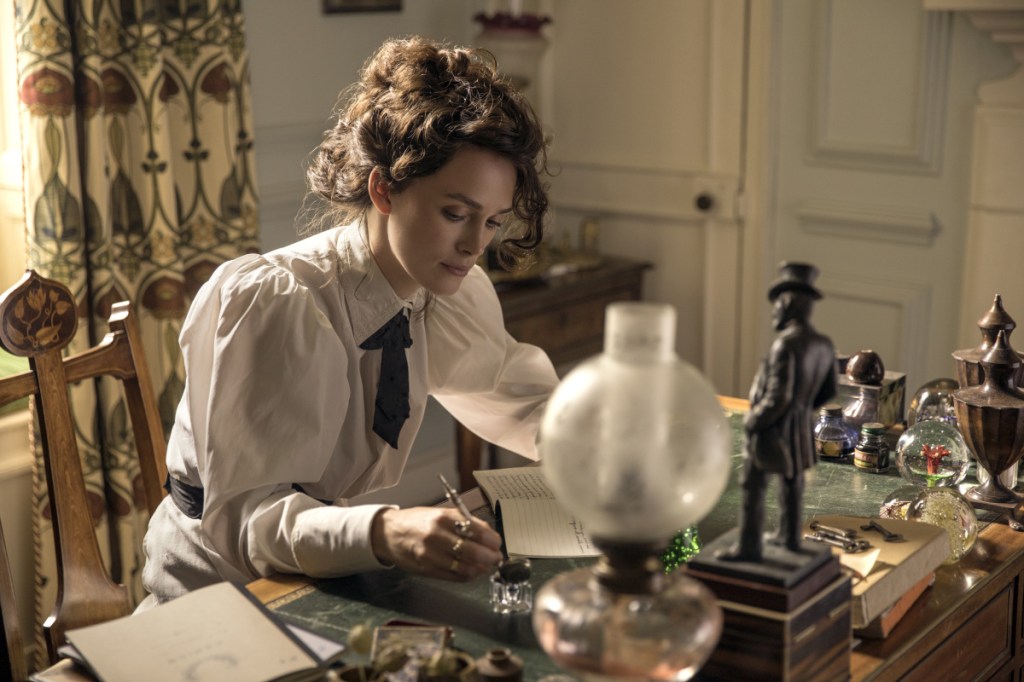Colette. I confess I knew little of this great French writer, but for a comment in a wartime dispatch from Hemingway. It ended with that.
You’re right. It was Colette who wrote “Gigi,” of course, a small novella that went, in modern terms, “viral” from theatre to movies, with Leslie Caron as the teenage courtesan in training.
Now there’s so much more to learn about Colette, and director Wash Westmoreland unpacks a lot of it.
He gives us Keira Knightley in full, wide-screen color, dancing, acting, wearing trousers and men’s jackets, cavorting with men, boys, and yes, women.
Hold on. That Keira Knightley?
Knightley has never been on my list of favorite actors, and mostly, I avoid her pictures. But now Keira has apparently decided to start exploring her inner heat with a capital H, and actually doing a sweet job of it.
We begin in a tiny French village in Burgundy, where we’re introduced to our Colette, the daughter of a crippled French war hero who collects taxes. One day, a friend of the family named Willy drops in for lunch, and is electrified by the flirtatious 15-year-old daughter.
Willy (Dominic West) manages a Paris publishing house of sorts, writers once called “the Factory.” Willy is a compilation of fraudulent farceur and charming con man, majestic social entertainer, gambler, philanderer and all around cad.
From the days at the farm, the couple begin romping in the local hay, and the next we know, they’re a well-known married couple in Paris, where after a while, Colette grows restless.
When Willy’s stable of ghost writers stop producing because of Willy’s abstract bookkeeping, he asks Colette to pen a few notes to see what she’s got. It turns out she’s “got” a “lot,” and it’s all “hot.”
Colette comes up with a series of semi-erotic novels about a girl named “Claudine,” a bi-sexual country girl with straw in her hair and the devil in her details.
They are published in English as “Claudine at School,” “Claudine in Paris,” “Claudine Married,” and “Claudine and Annie.” That last one, a tale of lesbian love, caused some to spit up their pate at tea time.
Here’s where it tiptoes along the edges of Björn Runge’s “The Wife.” All of the above are published with only Willy’s name on the covers, and suddenly, his “genius” is celebrated, as his lovely wife watches from the comfortable sidelines. “The Wife” redux.
When finally she tires of scratching in pen and ink, she’s rebels, but Willy locks her in her room until she starts scratching again.
After I spent part of my morning researching the amazing, long-neglected history of Colette, I was amazed that director Westmoreland and writers Richard Glatzer and Rebecca Lenkiewicz got as much onto the screen as they did, and that it was as honest as it was.
In real life, Colette’s dramatic journey flowed from 1912 to her terrifying life in German occupied Paris, where she was married to Maurice Goudeket, a Jew. Those years alone would make a movie on their own.
I repeat, Mademoiselle Knightley brings extra batteries to her role. I may start referring to her as “promising.”
Still, West almost steals her lunch and the picture, with a category 5 performance as Willy.
Fiona Shaw, the famous Irish actress known for her role as “Petunia Dursley” in five Harry Potter films, plays Colette’s mother.
The best of the cast must include knockout performances by Eleanor Tomlinson, of television’s “Poldark” series, and Denise Gough, both who bring equal doses of smoke and heat to Colette’s gay lovers, given to a full throated passion for sapphic chic. Brace yourself for their scenes.
Aside from Westmoreland’s excellent direction, what really contributes to the beauty of “Colette” is the camera of Giles Nuttgens (”Star Wars: Episode III) who magically turns Budapest into 1906 Paris, as well as Thomas Ages’ evocative score and Andrea Flesch’s incredible costumes, so rich and authentic they take your breath away. All who contribute to “Collette” create a perfect storm of cinematic artistry.
Do I gush? See for yourself; leave mother at home.
J.P. Devine, of Waterville, is a former stage and film actor.
Comments are not available on this story.
Send questions/comments to the editors.


